 MyDogBreeds
MyDogBreeds Grand Bleu de Gascogne is originated from France but Bergamasco is originated from Italy. Grand Bleu de Gascogne may grow 10 cm / 4 inches higher than Bergamasco. Both Grand Bleu de Gascogne and Bergamasco are having almost same weight. Grand Bleu de Gascogne may live 3 years less than Bergamasco. Grand Bleu de Gascogne may have less litter size than Bergamasco. Grand Bleu de Gascogne requires Low maintenance. But Bergamasco requires Moderate maintenance
Grand Bleu de Gascogne is originated from France but Bergamasco is originated from Italy. Grand Bleu de Gascogne may grow 10 cm / 4 inches higher than Bergamasco. Both Grand Bleu de Gascogne and Bergamasco are having almost same weight. Grand Bleu de Gascogne may live 3 years less than Bergamasco. Grand Bleu de Gascogne may have less litter size than Bergamasco. Grand Bleu de Gascogne requires Low maintenance. But Bergamasco requires Moderate maintenance
 The Grande Bleu de Gascogne is a dog which has descended from a line of French hounds. Originating in France, the dog is actually more common in the United States than in France.
The Grande Bleu de Gascogne is a dog which has descended from a line of French hounds. Originating in France, the dog is actually more common in the United States than in France.
They were bred to hunt, and today they continue to be used for hunting, but they double up as loyal pets too.
It is believed that they descended from dogs such as the St. Hubert Hound and the English Southern Hound. The dog itself has had an influence on the development of several scent-hound breeds.
In the United States, the Grande Bleu de Gascogne was bred in the 18th century already, displaying typical pack hound behavior.The dog isn't recognized by the AKC but he is recognized by other kennel clubs as a scenthound.
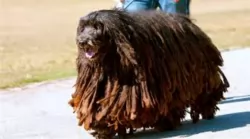 The Bergamasco comes from northern Italy. This medium sized sheepdog is of ancient origin. Known as an Italian sheep herding breed, his name actually comes from the town where he comes from - Bergamo.
The Bergamasco comes from northern Italy. This medium sized sheepdog is of ancient origin. Known as an Italian sheep herding breed, his name actually comes from the town where he comes from - Bergamo.
It was after World War II that there was danger that this breed would disappear as the need for herding and shepherding was diminishing. An Italian breeder, however, Dr. Maria Andreoli, stepped in to save the breed.
It was in 2015 that the American Kennel Club also changed the breed’s status from Miscellaneous to the Herding Group.
 The Grand Bleu de Gascogne is a large dog, standing at 65–72cm with the female usually being slightly smaller at 62–68cm. The dog weighs about 36 to 42kg.
The Grand Bleu de Gascogne is a large dog, standing at 65–72cm with the female usually being slightly smaller at 62–68cm. The dog weighs about 36 to 42kg.
He has a lean, muscular body with long legs, long ears and with a strong, noble appearance. The coat is short and smooth and the color of the coat is white and black mottled. In some instances, there'll be large patches of black over the back of the dog. The head and neck area can also be black. There are tan markings above each eye.
This is a gentle dog, not aggressive at all, and he just wants to get on with hunting. He is a social dog and loves to be around other familiar dogs and his human family. He essentially wants to live in the country where he can be busy and active with tasks to do.
If you leave him alone for too long, he becomes frustrated and resorts to baying. He can get on well with adults and children in the home, but tends to be aloof around strangers. He is an intelligent animal, and training and socialization will be important for him, especially since he is independent and likes doing things his way.
The training will make him obedient and he'll always know how to behave well around strangers.
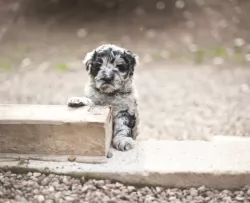 This medium sized sheepdog stands 54 – 62cm in height and weighs up to 38 kg as an adult. It is his coat which draws the most attention. It is of a coarse texture and actually greasy to the touch. It actually forms into strands or almost like dreadlocks from the top of the body, so that people agree he is one of shaggiest dog breeds there are.
This medium sized sheepdog stands 54 – 62cm in height and weighs up to 38 kg as an adult. It is his coat which draws the most attention. It is of a coarse texture and actually greasy to the touch. It actually forms into strands or almost like dreadlocks from the top of the body, so that people agree he is one of shaggiest dog breeds there are.
From age 1 on the coat starts to become woolly, and then the flocks start to form. As these clumps of hair appear, it will become necessary to separate them into smaller cords by hand to ensure attractive formation Brushing isn’t necessary but a big toothed comb can keep their hair ‘groomed’.
The colour of the coat is solid grey with patches of shades of grey and sometimes black. His dense, heavy coat makes it that he is suited to cooler climates. Because he is a herding dog, he wouldn’t do well in an apartment but would suit a home with a large garden.
He is intelligent and social but will need firm handling as he is a boisterous dog. He has a muscular yet compact body with a large head, long tail, high-set semi-drooping ears and large, gentle looking brown eyes. Although not instinctively aggressive, he makes an excellent watch dog with strong protective instincts to protect his human family.
He views new people into his circle with suspicion and wariness. He is good with kids and pets in the home and is playful and energetic.
 Your beautiful hunting dog is active and social and just loves to be out and about following a scent with other hunting dogs. This is what he absolutely loves to do.
Your beautiful hunting dog is active and social and just loves to be out and about following a scent with other hunting dogs. This is what he absolutely loves to do.
These days, apart from just hunting, he is also kept as a pet. He makes a good family companion because he is a non aggressive, gentle, even-tempered pet. Some of these dogs tend to be more reserved in nature. However your dog turns out, he can be your special friend when you give him all the exercise, nutrition and love that such a loyal dog deserves.
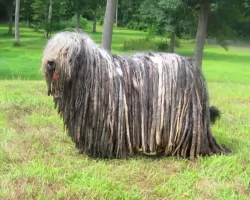 This is a working dog so they are naturally alert. He is also intelligent and independent and this independence is seen with training as he doesn’t take easily to following instructions, becoming stubborn. You’ll certainly want to have your Bergamasco socialized and trained as he can be a boisterous dog, bounding with energy.
This is a working dog so they are naturally alert. He is also intelligent and independent and this independence is seen with training as he doesn’t take easily to following instructions, becoming stubborn. You’ll certainly want to have your Bergamasco socialized and trained as he can be a boisterous dog, bounding with energy.
This is a dog that will need to be kept busy and provided with plenty of activities so that he remains happy, playful and relaxed.
Lively and intelligent, these dogs also form strong bonds with their owners and get on well with the children in the home. He will take well to country life as opposed to living in the city.
 As a dog not known for inherited health problems, the Grande Bleu de Gascogne, with good care, can live to be 12 years of age.
As a dog not known for inherited health problems, the Grande Bleu de Gascogne, with good care, can live to be 12 years of age.
Just like with other dog breeds, there are some conditions to which this dog may also be prone, and hip dysplasia is one.
The average litter size for the Grande Bleu de Gascogne is 4 to 7 puppies. It is important to prevent your puppy growing too quickly because this is precisely what leads to musculoskeletal problems as an adult.
If you're concerned about this, speak to your vet, as you want to do your best to prevent hip problems in the future.
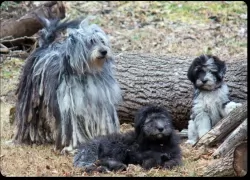 Your Bergamasco can live to be 13 to 15 years of age and he is considered to be a healthy breed. Nonetheless you want to be aware of health issues that are common to this breed
Your Bergamasco can live to be 13 to 15 years of age and he is considered to be a healthy breed. Nonetheless you want to be aware of health issues that are common to this breed
he is vulnerable to heat. He can die of heat exhaustion quicker than other breeds
keep an eye on him for hip dysplasia, progressive retinal atrophy and skin allergies
 Known for his hunting skills, the Grande Bleu de Gascogne has high exercise requirements. Although a walk is wonderful for him, it won't be enough. If you have a large garden, which will be ideal for him, throw the ball so he can fetch it. If you go cycling or jogging, he'll thank you for including him in these.
Known for his hunting skills, the Grande Bleu de Gascogne has high exercise requirements. Although a walk is wonderful for him, it won't be enough. If you have a large garden, which will be ideal for him, throw the ball so he can fetch it. If you go cycling or jogging, he'll thank you for including him in these.
The Grand Bleu’s short coat is conveniently low maintenance too so you aren't going to be spending anything on professional grooming. Give him a brush twice a week to remove loose hairs and to keep his coat silky and shiny.
Their long ears should be checked regularly for a build up of wax and dirt. Dampness can also be a problem if he loves to go swimming. You can buy special ear-cleaning-for-dog products. Never probe deep in the ears as you can damage them. Rather get advice from your vet or professional groomers on how to keep the inside of his ears clean and free from infection.
An energetic hunting scentdog like this requires high quality food with some raw meat added in from time to time. He must always have access to fresh, cool water.
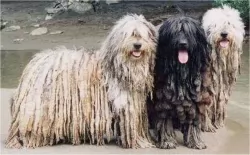 The Bergamasco isn’t a shedder but his coat will need to be combed once a week just to keep it in order. You don’t want to bath him too often, especially during the Winter as his coat takes a long time to dry. It isn’t recommended to shave a Bergamasco as the coat regulates the dogs temperature – keeping him warm and cold as the weather demands.
The Bergamasco isn’t a shedder but his coat will need to be combed once a week just to keep it in order. You don’t want to bath him too often, especially during the Winter as his coat takes a long time to dry. It isn’t recommended to shave a Bergamasco as the coat regulates the dogs temperature – keeping him warm and cold as the weather demands.
They thrive on a blend of kibble (dry) mixed with raw and-or moist food once or twice a day. Remember to include quality chicken, turkey, etc. mixed with some vegetables and rice into your dog’s diet. Ensure a constant supply of fresh water in an easily-cleanable bowl.
Balls and ropes are important for building muscle strength and burning energy. Remember your Bergamasco is a working breed and will need plenty of games and exercise.